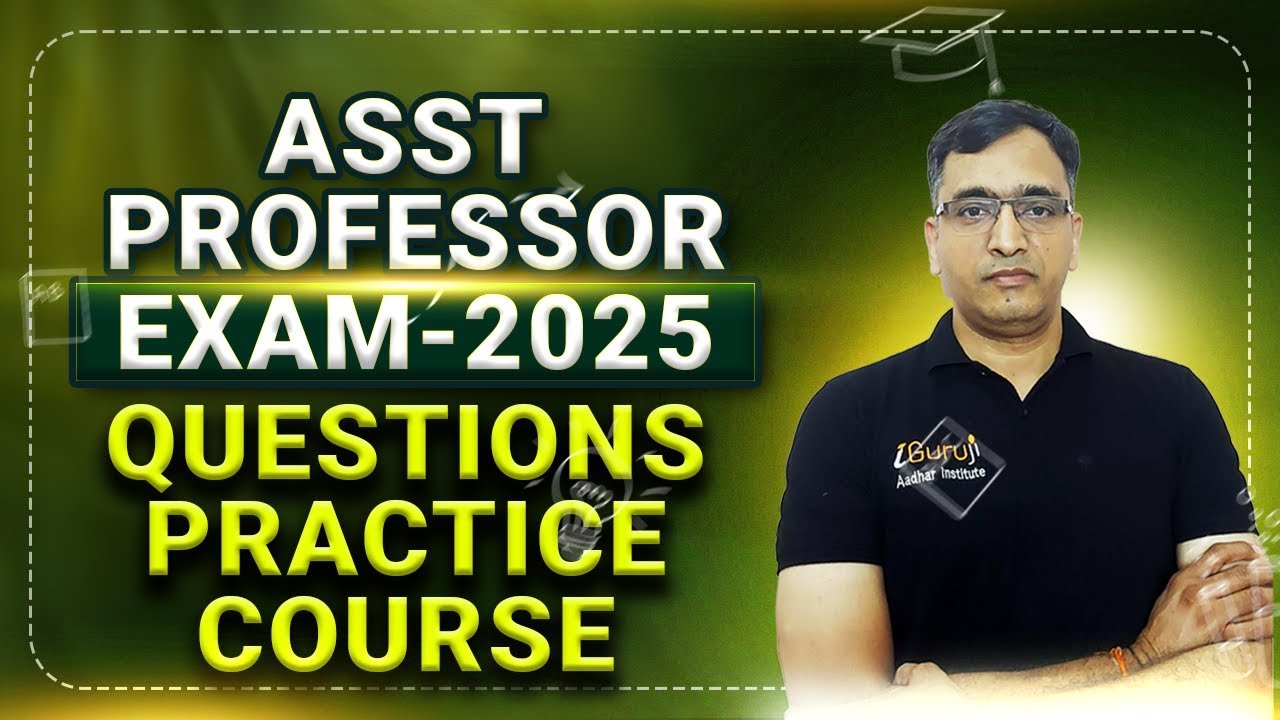
Becoming an Assistant Professor in India is a dream for many postgraduate students who wish to enter the world of academics, research, and higher education. Whether you’re preparing for UGC NET, State Eligibility Tests (SETs) like MPSET, RPSC SET, MH-SET, or university-level recruitment exams, the preparation strategy remains similar. These exams test a candidate’s subject knowledge, teaching aptitude, and research skills. Cracking them requires the right mix of preparation, discipline, and smart study techniques.
This article provides a step-by-step guide to help you crack the Assistant Professor eligibility exams with confidence.
1. Understand the Exam Pattern and Syllabus Thoroughly
Your preparation starts with a clear understanding of the exam structure. Most Assistant Professor eligibility exams consist of:
Paper 1 – Teaching & Research Aptitude
This paper checks:
-
Reasoning ability
-
Reading comprehension
-
Data interpretation
-
Teaching methods and classroom communication
-
Research methodology
-
ICT (digital tools)
-
Higher education system
-
Environment and people development
Paper 2 – Subject-Specific Test
This paper focuses entirely on the subject chosen by the candidate, such as:
-
English
-
Hindi
-
Geography
-
History
-
Political Science
-
Commerce
-
Economics
-
Sociology
-
Management
-
Computer Science
… and many more.
Download the latest syllabus from the official website (UGC or State SET portal). Keep it as your roadmap throughout your preparation.
2. Make a Smart Study Plan
A good preparation strategy is not about studying more hours—it’s about studying effectively.
Daily Study Routine Suggestion
-
2 hours – Paper 1
-
3 hours – Paper 2
-
1 hour – Revision or practice questions
Weekly Plan
-
Cover 3–4 topics of Paper 1
-
Cover 2–3 major chapters of Paper 2
-
Solve at least one mock test weekly
Monthly Plan
-
Complete one full revision of both papers
-
Attempt 3–5 full-length mocks
-
Analyze your weak areas
A well-structured plan prevents confusion and keeps you motivated.
3. Strengthen Your Paper 1 Preparation
Paper 1 is scoring and can boost your final result. Focus on mastering these topics:
Teaching Aptitude
-
Learning theories
-
Teaching methods
-
Learner characteristics
-
Classroom communication
-
Evaluation systems
Research Aptitude
-
Types of research
-
Hypothesis
-
Data collection methods
-
Sampling
-
Research ethics
Reasoning & Logical Skills
-
Number series
-
Coding-decoding
-
Analogy
-
Logical arguments
-
Venn diagrams
Data Interpretation & Comprehension
Practice daily for speed improvement.
ICT & Higher Education System
These topics are factual and easy to score with revision.
Use free online lectures, PDFs, and previous-year questions to strengthen these sections.
4. Build Strong Subject Knowledge for Paper 2
Paper 2 is the most important part of the exam. Use the following strategies:
Start with Basics
Use standard books and university-level references. NCERTs (for subjects like History, Geography, Economics) are excellent starting points.
Advanced Level Reading
Follow:
-
University textbooks
-
IGNOU study materials
-
Research papers (Google Scholar)
-
Classroom lecture notes
-
Online open courseware
Make Topic-Wise Notes
Your notes should include:
-
Important theories
-
Summaries
-
Definitions
-
Formulas
-
Diagrams
-
Chronological lists (for History, Literature)
Solve Previous-Year Papers
This shows:
-
Question trends
-
Difficulty level
-
Important topics
Most toppers solve previous-year papers at least 3–4 times.
5. Practice Daily with Mock Tests and Quizzes
Mock tests are the key to cracking any competitive exam.
Benefits of Mock Tests
-
Improves time management
-
Builds exam confidence
-
Identifies strengths and weaknesses
-
Improves question accuracy
-
Helps you understand question patterns
Make sure to:
-
Attempt topic-wise tests
-
Solve full-length mock tests weekly
-
Analyse every mistake
Consistency is more important than speed.
6. Follow Quality Study Resources
You don’t need to buy too many books—quality is better than quantity. Good resources include:
Paper 1:
-
UGC NET Paper 1 standard books
-
NCERT Class 6–10 Maths (for reasoning)
-
Free online videos and notes
Paper 2:
-
Subject-specific textbooks
-
University curriculum books
-
Research-based reference materials
Choose resources you can revise multiple times.
7. Revision is the Real Secret to Cracking the Exam
Many aspirants study a lot but revise very little. Revision helps you retain concepts and improve memory.
Revision Strategy
-
Revise daily (30 minutes)
-
Revise weekly (2 hours)
-
Revise monthly (one full day)
-
Revise before exams (10–15 days)
Focus on:
-
Short notes
-
Highlighted points
-
Repeated questions
-
Formulas and theories
8. Stay Updated with Current Affairs & Education Policies
For Paper 1, questions often come from:
-
National Education Policy (NEP 2020)
-
Higher education reforms
-
ICT tools
-
Environmental issues
-
Cultural developments
Spend 10–15 minutes daily reading reliable news summaries.
9. Maintain a Positive Mindset and Consistency
The journey to become an Assistant Professor is competitive but achievable. Stay positive and consistent.
Tips for Motivation
-
Set weekly goals
-
Join study groups
-
Track your mock test performance
-
Celebrate small achievements
Even one hour of focused study is better than five hours of distracted study.
Conclusion
Cracking the Assistant Professor exam requires a combination of:
-
Strategic planning
-
Strong subject knowledge
-
Mock test practice
-
Revisions
-
Time management
-
Confidence
With the right approach and consistent effort, you can qualify the exam and take the first step toward a prestigious career in teaching and research.
